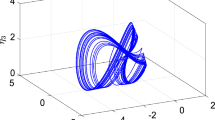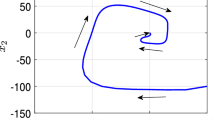Abstract
In many emerging scientific applications, the input of random initial time is often required for predicting and controlling the dynamics of real-order systems that include or does not include time-delays. In this work, we provide a new design for a class of random initial-time non-autonomous linear Caputo-type real-order time-delay systems that involves constant discrete delays. We first introduce a new comparison principle and a linear comparison lemma for Caputo derivative. By using the idea of comparison methodology and generalized Laplace transform, we develop some new elementary asymptotic theories and establish order-dependent and delay-independent conditions that give convergence of nontrivial solutions to such a class of system. One of the major challenges encountered in the investigation is discovering some simpler classes of autonomous linear real-order systems in bounding the coefficient matrices of a designed class of systems above by constant matrices in our assumptions. These assumptions including newly introduced matrices \(\Lambda \), \(\Theta _{k}\) and G provide some fundamental key tools for an effective asymptotic analysis of newly designed class of systems. A typical theorem that we develop says that if all the diagonal entries of \(\Lambda \) become negative and every root of the characteristic equation associated with the matrix \(\Lambda +\sum \nolimits _{k=1}^{m}\Theta _{k}G\) lies in the open left-half complex plane, then it is possible to predict the limiting behavior of the designed class of systems. For a practical application of interest, we show how to synchronize the possible chaotic dynamics of the coupled nonlinear Duffing oscillators if the system starts at a negative initial time through some proposed results.




Similar content being viewed by others
Data availability
Not applicable.
References
Aguila-Camacho N, Duarte-Mermoud MA, Gallegos JA (2014) Lyapunov functions for fractional order systems. Commun Nonlinear Sci Numer Simul 19:2951–2957. https://doi.org/10.1016/j.cnsns.2014.01.022
Almeida R (2017) A Caputo fractional derivative of a function with respect to another function. Commun Nonlinear Sci Numer Simul 44:460–481. https://doi.org/10.1016/j.cnsns.2016.09.006
Chen WC (2008) Nonlinear dynamics and chaos in a fractional-order financial system. Chaos Solitons Fractals 36:1305–1314. https://doi.org/10.1016/j.chaos.2006.07.051
Chen L, Chai Y, Wu R, Ma T, Zhai H (2013) Dynamic analysis of a class of fractional-order neural networks with delay. Neurocomputing 111:190–194. https://doi.org/10.1016/j.neucom.2012.11.034
Deng WH, Li CP (2005) Chaos synchronization of the fractional Lü system. Physica A 353:61–72. https://doi.org/10.1016/j.physa.2005.01.021
Deng W, Li C, Lü J (2007) Stability analysis of linear fractional differential system with multiple time delays. Nonlinear Dyn 48:409–416. https://doi.org/10.1007/s11071-006-9094-0
Diethelm K, Ford NJ, Freed AD (2002) A predictor–orrector approach for the numerical solution of fractional differential equations. Nonlinear Dyn 29:3–22. https://doi.org/10.1023/A:1016592219341
Gallegos JA, Aguila-Camacho N, Duarte-Mermoud M (2020) Vector Lyapunov-like functions for multi-order fractional systems with multiple time-varying delays. Commun Nonlinear Sci Numer Simul 83:105089. https://doi.org/10.1016/j.cnsns.2019.105089
Gholamin P, Sheikhani AHR, Ansari A (2021) Stabilization of a new commensurate/incommensurate fractional order chaotic system. Asian J Control 23:882–893. https://doi.org/10.1002/asjc.2289
Holmgren HJ (1866) Om differentialkalkylen med indices af hvad natur som helst. Kungl Svenska Vetenskaps-Akademins Handlingar: Stockholm 5:1–83
Huang C, Cai L, Cao J (2018) Linear control for synchronization of a fractional-order time-delayed chaotic financial system. Chaos Solitons Fractals 113:326–332. https://doi.org/10.1016/j.chaos.2018.05.022
Kaczorek T, Rogowski R (2015) Fractional linear systems and electrical circuits. Springer, Heidelberg
Kilbas AA, Srivastava HM, Trujillo JJ (2006) Theory and applications of fractional differential equations. Elsevier, Amsterdam
Lenka BK (2019) Fractional comparison method and asymptotic stability results for multivariable fractional order system. Commun Nonlinear Sci Numer Simul 69:398–415. https://doi.org/10.1016/j.cnsns.2018.09.016
Lenka BK, Banerjee S (2016) Asymptotic stability and stabilization of a class of nonautonomous fractional order systems. Nonlinear Dyn 85:167–177. https://doi.org/10.1007/s11071-016-2676-6
Lenka BK, Banerjee S (2018) Sufficient conditions for asymptotic stability and stabilization of autonomous fractional order systems. Commun Nonlinear Sci Numer Simul 56:365–379. https://doi.org/10.1016/j.cnsns.2017.08.005
Lenka BK, Bora SN (2022a) Asymptotic convergence criteria for nonhomogeneous linear fractional order systems. J Fract Calc Appl 13:237–250
Lenka BK, Bora SN (2022b) New global asymptotic stability conditions for a class of nonlinear time-varying fractional systems. Eur J Control 63:97–106. https://doi.org/10.1016/j.ejcon.2021.09.008
Lenka BK, Bora SN (2023a) New criteria for asymptotic stability of a class of nonlinear real-order time-delay systems. Nonlinear Dyn 11:4469–4484. https://doi.org/10.1007/s11071-022-08060-8
Lenka BK, Bora SN (2023b) Asymptotic stability and linear feedback control of real order systems with multiple time delays. Int J Dyn Control 11:428–440. https://doi.org/10.1007/s40435-022-00988-4
Lenka BK, Bora SN (2023c) New approach to asymptotics, dynamics and control of initial time real order systems (Submitted)
Li C, Li Z (2021a) Stability and logarithmic decay of the solution to Hadamard-type fractional differential equation. J Nonlinear Sci 31:1–60. https://doi.org/10.1007/s00332-021-09691-8
Li C, Li Z (2021b) Stability and \(\psi \)-algebraic decay of the solution to \(\psi \)-fractional differential system. Int J Nonlinear Sci Numer Simul 24:695–733. https://doi.org/10.1515/ijnsns-2021-0189
Li C, Li Z (2022) The finite-time blow-up for semilinear fractional diffusion equations with time \(\psi \)-Caputo derivative. J Nonlinear Sci 32:82. https://doi.org/10.1007/s00332-022-09841-6
Li CP, Li ZQ, Yin CT (2022) Which kind of fractional partial differential equations has solution with exponential Asymptotics?. In: Dzielinski A, Sierociuk D, Ostalczyk P (eds) Proceedings of the international conference on fractional differentiation and its applications (ICFDA’21). Lecture notes in network systems, vol 452. Springer, Cham, pp. 112–117
Liang S, Wu R, Chen L (2015) Comparison principles and stability of nonlinear fractional-order cellular neural networks with multiple time delays. Neurocomputing 168:618–625. https://doi.org/10.1016/j.neucom.2015.05.063
Mahmoud GM, Arafa AA, Abed-Elhameed TM, Mahmoud EE (2017) Chaos control of integer and fractional orders of chaotic Burke–Shaw system using time delayed feedback control. Chaos Solitons Fractal 104:680–692. https://doi.org/10.1016/j.chaos.2017.09.023
Monje CA, Chen Y, Vinagre BM, Xue D, Feliu-Batlle V (2010) Fractional-order systems and controls: fundamentals and applications. Springer, Heidelberg
Oldham K, Spanier J (1974) Fractional calculus theory and applications of differentiation and integration to arbitrary order. Academic Press, London
Osler JT (1970) The fractional derivative of a composite function. SIAM J Math Anal 1:28–293. https://doi.org/10.1137/0501026
Petráš I (2011) Fractional-order nonlinear systems: modeling, analysis and simulation. Springer, Heidelberg
Podlubny I (1999) Fractional differential equations. Academic Press, San Diego
Shaojie W, He S, Yousefpour A, Jahanshahi H, Repnik R, Perc M (2020) Chaos and complexity in a fractional-order financial system with time delays. Chaos Solitons Fractals 131:109521. https://doi.org/10.1016/j.chaos.2019.109521
Sousa JVC, De Oliveira EC (2018) On the \(\psi \)-Hilfer fractional derivative. Commun Nonlinear Sci Numer Simul 60:72–91
Thanh NT, Trinh H, Phat VN (2017) Stability analysis of fractional differential time-delay equations. IET Control Theory Appl 11:1006–1015. https://doi.org/10.1049/iet-cta.2016.1107
Tuan HT, Trinh H, Lam J (2021) Positivity and stability of mixed fractional-order systems with unbounded delays: necessary and sufficient conditions. Int J Robust Nonlinear Control 31:37–50. https://doi.org/10.1002/rnc.5256
Wang S, Yu Y, Wen G (2014) Hybrid projective synchronization of time-delayed fractional order chaotic systems. Nonlinear Anal Hybrid Syst 11:129–138. https://doi.org/10.1016/j.nahs.2013.07.004
Wei Y, Wei Y, Zhang H, Cheng S (2020) Description and realization for a class of irrational transfer functions with nonzero initial instant. In: 2020 Chinese Automation Congress (CAC), pp 2646–2651 https://doi.org/10.1109/CAC51589.2020.9326321
Weiwei Z, Cao J, Alsaedi A, Alsaadi EES (2017) Synchronization of time delayed fractional order chaotic financial system. Discrete Dyn Nat Soc 2017:1230396. https://doi.org/10.1155/2017/1230396
Zhang Z, Wang Y, Zhang J, Ai Z, Liu F (2022) Novel stability results of multivariable fractional-order system with time delay. Chaos Solitons Fractal 157:111943. https://doi.org/10.1016/j.chaos.2022.111943
Acknowledgements
Bichitra Kumar Lenka acknowledges Indian Institute of Technology Guwahati for providing facilities for carrying out this research. The authors would like to thank the esteemed Reviewer for the insightful review which have helped us to improve the quality of the manuscript to its current form. The Associate Editor Prof. Vasily E. Tarasov and Editor in Chief Prof. José Eduardo Souza de Cursi are thanked for allowing a revision.
Funding
No funding was available.
Author information
Authors and Affiliations
Contributions
Both authors contributed to the study conception, design and material preparation. Both authors read and approved the final manuscript.
Corresponding author
Ethics declarations
Conflict of interest
Both authors have no relevant financial or non-financial interests to disclose.
Additional information
Publisher's Note
Springer Nature remains neutral with regard to jurisdictional claims in published maps and institutional affiliations.
Rights and permissions
Springer Nature or its licensor (e.g. a society or other partner) holds exclusive rights to this article under a publishing agreement with the author(s) or other rightsholder(s); author self-archiving of the accepted manuscript version of this article is solely governed by the terms of such publishing agreement and applicable law.
About this article
Cite this article
Lenka, B.K., Bora, S.N. Limiting behaviour of non-autonomous Caputo-type time-delay systems and initial-time on the real number line. Comp. Appl. Math. 42, 313 (2023). https://doi.org/10.1007/s40314-023-02459-8
Received:
Revised:
Accepted:
Published:
DOI: https://doi.org/10.1007/s40314-023-02459-8
Keywords
- Asymptotic stability
- Caputo-type time-delay system
- Delayed Duffing oscillator
- Initial-time
- Non-autonomous real-order system
- Nonlinear system




